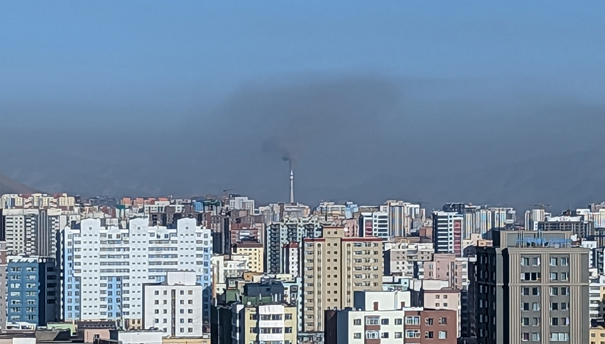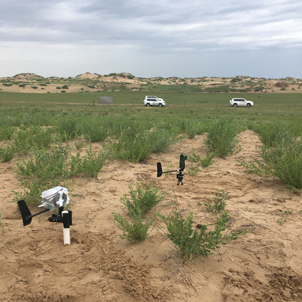
Activities
Air Pollution Control
International Cooperation on Air Pollution and DSS Control in Asia
Against the background of economic development in Asia, air pollution such as PM2.5, photochemical oxidant and other suspended particulate matter continue to affect the health of many people, hence the importance of promoting international cooperation on transboundary pollution. The cooperation on air pollution, Dust and Sand Storms (DSS) between Japan, China and Korea has been underway for many years under the Tripartite Environment Ministers’ Meeting (TEMM), with Mongolia having recently joined. OECC has been supporting these cooperation activities since 2009 on consignment from the Ministry of the Environment, Japan.

Winter in Ulaanbaatar, Mongolia
Air pollution at the surface level of urban areas is concerning. Air pollutants emitted from coal combustion and which linger in the basin make the mountains and the distant blue skies invisible.
Support for Joint Research on DSS Monitoring, Forecasting, Prevention and Control Measures between Japan, China, Korea and Mongolia
OECC has been supporting the activities of DSS researchers and experts in the Northeast Asian region as the designated secretariat of the TEMM DSS Joint Research which consists of two DSS working groups(WG): WGI for DSS monitoring network and early warning systems and WGII for DSS prevention and control measures. OECC facilitates annual working group meetings and supports the implementation of the WG five-year action plan. In recent years, in view of the growing interest in the relationship between DSS and climate change, and the fact that dust storms are an issue in some regions outside Northeast Asia, OECC has expanded its work, including further promoting research exchange activities and holding seminars.

TEMM DSS Joint Research in Inner Mongolia
Prospects for International Cooperation in Combating Air Pollution and DSS
Thanks in part to various international cooperation and self-help efforts to date, air quality in China and Northeast Asia has been significantly improved. On the other hand, in recent years, the challenges of combating wide-area air pollution caused by meteorological changes and agricultural waste incineration, as well as short-lived climate pollutants, have been increasingly recognized in various regions of Asia. Not only does this cause air pollution but also contributes to climate change. There is also growing interest in new initiatives such as the co-benefit approach, where climate change measures further benefit air pollution control and low-cost air pollution monitoring using semiconductor sensors and AI. Additionally, new developments in international cooperation are being seen, with the Acid Deposition Monitoring Network in East Asia (EANET) deciding to tackle air pollution other than acid rain. Member states of the UN Economic and Social Commission for Asia and the Pacific (UNESCAP) also adopted a regional action plan for air pollution, including dust storms, at the end of 2022. OECC will continue to explore additional activities for implementation in the future.
Introduction of the TEMM DSS Online Portal
The TEMM DSS Online Portal was launched in 2021. This online portal introduces the contents of the TEMM DSS Joint Research and a series of DSS research papers. OECC helped to develop and continues to maintain this online portal.
